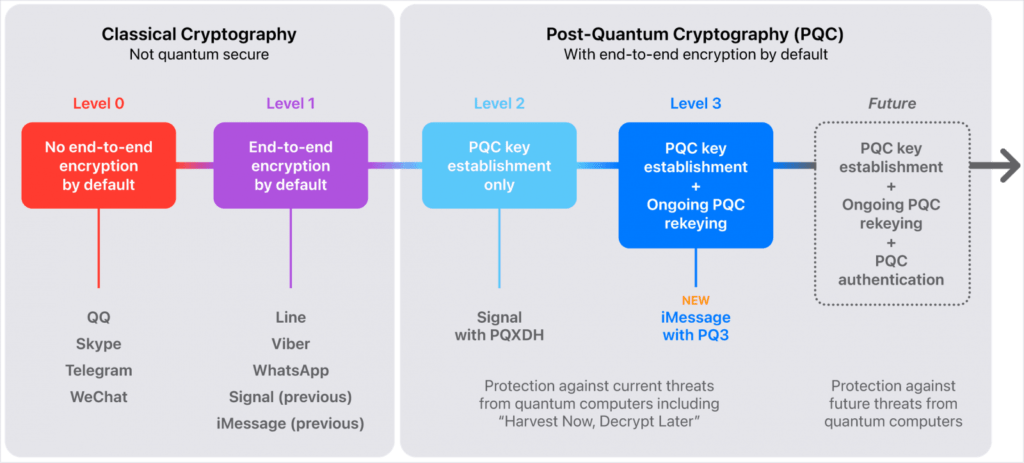The future of secure communication has arrived ! Apple has just struck a major blow in the world of instant messaging by integrating post-quantum PQ3 encryption into iMessage. This major advance offers unprecedented protection against quantum attacks, which threaten to make traditional cryptographic schemes obsolete.
What is post-quantum encryption?
Quantum computing is advancing by leaps and bounds, and with it, the threat of hacking into today's encrypted data. Quantum computers, thanks to their phenomenal computing power, could break classical encryption algorithms in the blink of an eye. This is where post-quantum encryption comes in, designed to resist these future attacks.
PQ3: Level 3 security for iMessage

Apple has spared no expense in ensuring the security of communications on iMessage. PQ3 is not a simple replacement for the old system, but rather an addition that strengthens protection in new ways. This new protocol is the result of a collaboration with cryptography experts and is based on the Kyber algorithm, recognized by NIST for its robustness.
PQ3's revolutionary features
- Initial key establishment : Encryption keys are created at the start of the conversation, even if the recipient is offline.
- Post-quantum periodic key change : Keys are regularly regenerated to ensure optimal security against evolving attacks.
- Recovery of compromised keys : In the event of a compromise, new keys are generated without affecting ongoing conversations.
A giant step forward for communications security
The integration of PQ3 into iMessage is a major step forward for communications security at scale. Apple thus establishes itself as a leader in data protection and encourages other market players to follow its example.
Technical operation of PQ3

PQ3 is based on a hybrid model combining the proven ECC algorithm and the new Kyber for optimal security. The encryption process is composed of several steps:
- Diffie-Hellman (DH) key exchange : Devices establish a secure communication channel by exchanging public keys.
- Protocol negotiation : Devices agree on which encryption algorithms to use, including PQ3 and ECC.
- Message encryption : Messages are symmetrically encrypted with a randomly generated session key.
- Message Authentication : Digital signatures guarantee the integrity and authenticity of messages.
The introduction of PQ3 to iMessage is transparent to users, meaning they don't need to take any action to take advantage of its security benefits. Security is strengthened in the background, without any interruption or impact on the smooth flow of communications.
Here are some more details about PQ3's impact on user experience:
- Compatibility : PQ3 is compatible with current versions of iMessage on iOS and macOS. Users do not need to update their device to enjoy the increased security.
- Performance : PQ3 was designed to be efficient and not have a significant impact on battery life or device performance.
- Privacy : PQ3 does not collect any additional personal or usage data. User privacy remains a top priority for Apple.
- Ease of use : PQ3 is easy to use and does not require any special technical knowledge. Users can continue to use iMessage as they usually do without worrying about security.
In addition to these points, here are some other aspects to consider:
- Adoption by other platforms : Apple's integration of PQ3 could encourage other messaging platforms to adopt post-quantum encryption solutions, which would help improve the security of digital communications generally.
- Future Developments : The field of post-quantum cryptography is constantly evolving. Apple is committed to monitoring progress and updating PQ3 as necessary to ensure optimal protection against future threats.
In conclusion, the implementation of PQ3 in iMessage is a major step forward for large-scale communications security. This innovation from Apple provides robust protection against future quantum attacks without impacting user experience.




